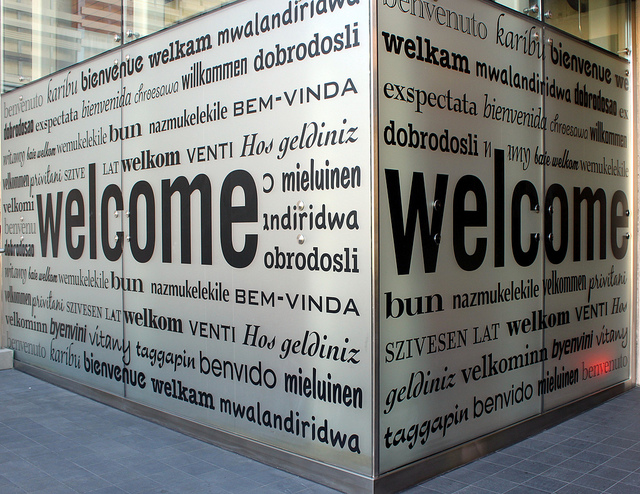Can you speak a foreign language? Probably not, right? That’s because only about 9% of the US population is bilingual, while 65% of the rest of the world is, according to the Census Bureau. Crazy numbers, but it’s not so hard to believe. English is everywhere and used as the main language of business, science, between people who have different native languages, and for innumerable other reasons. So why do you need to speak a second language when English is the international language of the world.
While it’s true that English will take you to many corners of the earth without any problem, t to be able to speak another language has endless advantages. It’s something that will set you apart, you’ll become more culturally aware, and it will potentially allow you to make connections across the globe that you wouldn’t have made otherwise. This is especially important in our constantly globalizing world, with companies always expanding and going international.
So go ahead and take up Spanish, Chinese, German or whatever language you think you would enjoy or benefit from. It will give you and your business an edge that will lead to amazing opportunities. Maybe even on your next business trip, you can express a particular interest in who you’re meeting by learning a little bit of their language, which could make that future deal that much better.
But now you’re probably thinking that while that sounds great and all, it just gets boring after a while and takes years to learn a language. The good news is: technology has changed that. Even something that most people find boring, like grammar exercises, can suddenly become a fun activity, and mobile language learning apps do just that. The best part is that they’re portable and (usually) free. So without further ado, here are a few of the best free apps available for learning a language!
Duolingo
Today, Duolingo is known as the best language-learning app on the market, and I can only agree. Even an independent study found that it was better than university-level language learning and was recognized as Google Play’s “Best of the Best” and Apple’s “App of the Year” for 2013. So what makes it so awesome? It’s actually fun and engaging and goes beyond just learning vocabulary. It has sections on specific grammar, which is often left out, so you really are getting all major parts necessary to learn a language. It also has features like being able to level up and compare your scores with Facebook friends, or earn points for special concepts like idioms. This app is very comprehensive, and you can play for hours and still not beat it. Even with a few years of German behind me, I’m still unable to test out of all the levels.
The only downsides are that not all languages have native speaker recordings, and the “immersion” section involves translating documents like Wikipedia articles, which is not the best way or most exciting way to get immersed.
Gameplay: Speaking (microphone optional), translating, multiple choice questions, vocabulary with pictures and audio, all in various organized themes.
Languages: Spanish, French, German, Italian and Portuguese, with others in beta, as well as languages for those with a different mother tongue
Google Play rating: 4.6 stars
Memrise
Memrise is a great way to expand your vocabulary. The decks are crowd-sourced, and there are actually topics/subjects beyond languages, such as history or geography. Though, for language learning, it’s very useful, with decks like “First 1000 Words of Spanish” or “450 Most Common French Words,” and the method here is memorizing vocabulary with mnemonic aids, like including a funny picture along with the word, making it easier to remember. If you don’t like the “mem” presented, you can have the option of choosing another one that better suits you. Another unique aspect to the app is that instead of “learning” or “reviewing” words, it’s called “growing” and “watering.” You’re mind is an ever-growing garden in this game – one that needs to be tended to regularly, so it encourages reviewing and makes forgetting much less likely.
Gameplay: Create and choose “mems,” new vocabulary introduced with definitions, pictures, and native speaker audio, multiple choice questions, spelling
Languages: Chinese, English, French, German, Italian, Japanese, Brazilian Portuguese, Russian, Mexican Spanish, and more from visiting the website
Google Play rating: 4.6 stars
Babbel
Babbel is also a great tool for rapidly expanding your vocabulary. There are loads of words based on topics like “society,” “digital world,” and “lifestyle,” each with their own subtopics, where there are about 10 new words for each. This app introduces words via audio by a native speaker, supplementing with pictures, and translations, until you recognize the word by just a picture through spelling and multiple choice, which really forces you to know the word by heart. There are also fill-in-the-blank sentences, so that you can actually see an example of how the word is used. The only problem with that, though, is you may not entirely understand the sentence, if your grammar skills are lacking. Overall, it’s a very effective way to learn new words.
Gameplay: Learning vocabulary through pictures and audio (microphone optional), translation, spelling, fill-in-the-blank sentences, review manager
Languages: English, German, Spanish, Italian, French, Portuguese, Swedish, Turkish, Dutch, Polish, Indonesian
Google Play rating: 4.5 stars
There are a few other great apps out there, but these are the best that money can’t buy! None of them are going to make you fluent overnight, but they’re a fun way to get started, to know just enough to get around comfortably in a foreign country, or to make a deeper connection with whomever you’re doing business. Whatever you decide, you can only profit from learning another language! C’est vrai?
Image Credit: CC by Prayitno





